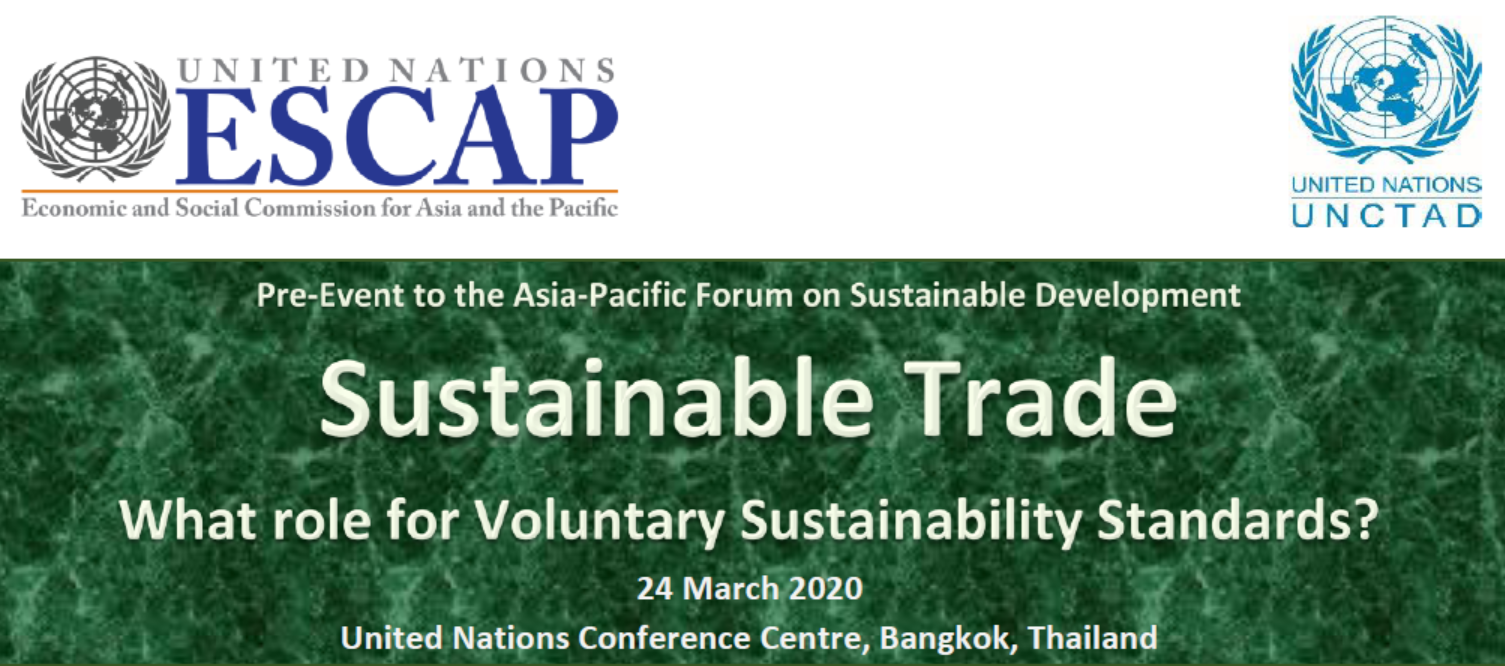Role for VSS on Sustainable Trade, APFSD pre-event in Thailand
发布于:2020-02-12

Overview of the Event
Over the past decades, gains from trade-led growth have helped lift millions out of poverty in the Asia-Pacific region. At the same time, increases in production and trade have led to overuse of natural resources, increased emissions, and increased inequalities. Developing countries still depend heavily on natural resource-based products for their exports and growth. Thus, greening global trade will be important to achieve sustainable development.
Voluntary sustainability standards (VSS) can play a role in this regard. They are standards that are used to ensure that a product is produced, processed or transported in accordance with certain sustainability metrics, such as its environmental impact, basic human rights, labour standards, and gender equality. In many instances, the targeted metrics overlap with the entry points for transformation required to achieve the SDGs at the scale and speed needed, as identified in the Global Sustainable Development Report: human well-being and capabilities; sustainable and just economies; sustainable food systems and healthy nutrition; energy decarbonization and access; urban and peri-urban development; and global environmental commons.
As a pre-event to the 7th Asia-Pacific Forum on Sustainable Development (APFSD), to be held on 25-27 March 2020, this workshop will discuss the role of VSS in greening trade, thus advancing the transition towards more sustainable food systems, one of the six priority pathways of the Global Sustainable Development Report, and helping smallholder producers and micro and small businesses in the region make greater and sustainable economic gains from green trade.
Issues addressed in the event
The green market, i.e. the market for sustainably produced goods and services, shows the fastest growth in international trade today. Carrying a VSS as a proof of sustainable production can help producers and businesses access the growing and potentially lucrative green market. However, certifying for VSS can be a significant challenge to smallholder producers and micro/small businesses in developing countries. A supportive policy framework is needed to ensure that smallholders and small businesses get a fair access to the green market, in a manner that benefits them economically, socially and environmentally.
The event will discuss opportunities presented by expanding markets for green goods and services, what role voluntary sustainability standards can play in greening trade, and policy actions needed to support SMEs in entering these growing market segments. It will share knowledge, learnings, and good practices of green trade based on the findings from the implementation of the UNCTAD project Fostering green exports through VSS and ESCAPs Asia-Pacific Trade and Investment Report 2019 Navigating Non-tariff Measures towards Sustainable Development, as well as on the activities of the United Nations Forum on Sustainability Standards (UNFSS).
Participation
The meeting is open to all UN Member States, specialized agencies, intergovernmental bodies and non-governmental organizations in the general category, as well as academia, research institutions and the private sector. The focus of discussion may be primarily addressed to government experts, businesses and non-governmental organizations from the Asian and Pacific States.
- 关于发布《自愿性可持续标准编制指南》的公告
- 关于公开征求团体标准《自愿性可持续标准编制指南》(征求意见稿)意见的通知
- 可持续金融:欧盟议会通过分类条例
- 《自愿性可持续标准评价指南》征集意见
- 关于公开征集《自愿性可持续标准编制指南》 起草单位及起草人的函
为了鼓励和倡导全社会共同关注自愿性可持续标准热点问题,扩展互动交流空间,特通过本网站及微信公众号,面向相关组织机构、技术工作者等征集主题相关稿件。投稿联系邮箱:ll@china-cas.org
